Number 747 - Queen
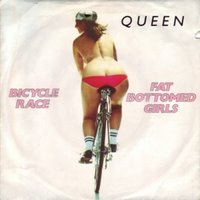
Number 747
Queen
"Fat Bottom Girls"
(1978)
.
.
.
Genre:Rock
 Gazza here.... Yes i know, a few of you got %!%^@$&* upset because i swore, says limp wristed crowbarred. Well, i been thinking about my attitude, so here you are... &^$%^%#$#@ !
Gazza here.... Yes i know, a few of you got %!%^@$&* upset because i swore, says limp wristed crowbarred. Well, i been thinking about my attitude, so here you are... &^$%^%#$#@ !When it comes to Queen there are no innocents in friendly fire! As far as i'm concerned "Fat Bottom Girls" should be the NUMBER 1 of "The Definitive 1000 songs Of All Time" !!! But crowbarred has the final say (we will see).
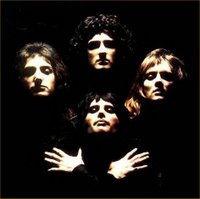 "Few bands embodied the pure excess of the '70s like Queen. Embracing the exaggerated pomp of prog rock and heavy metal, as well as vaudevillian music hall, the British quartet delved deeply into camp and bombast, creating a huge, mock-operatic sound with layered guitars and overdubbed vocals. Queen's music was a bizarre yet highly accessible fusion of the macho and the fey. For years, their albums boasted the motto "no synthesizers were used on this record," signaling their allegiance with the legions of post-Led Zeppelin hard rock bands. But vocalist Freddie Mercury brought an extravagant sense of camp to the band, pushing them toward kitschy humor and pseudo-classical arrangements, as epitomized on their best-known song, "Bohemian Rhapsody." Freddie Mercury, it must be said, was a flamboyant bisexual who managed to keep his sexuality in the closet until his death from AIDS in 1992. Nevertheless, his sexuality was apparent throughout Queen's music, from their very name to their veiled lyrics -- it was truly bizarre to hear gay anthems like "We Are the Champions" turn into celebrations of sports victories. That would have been impossible without Freddie Mercury, one of the most dynamic and charismatic frontmen in rock history. Through his legendary theatrical performances, Queen became one of the most popular bands in the world in the mid-'70s; in England, they remained second only to The Beatles in popularity and collectibility in the '90s. Despite their enormous popularity, Queen were never taken seriously by rock critics -- an infamous Rolling Stone review labeled their 1979 album Jazz as "fascist." In spite of such harsh criticism, the band's popularity rarely waned; even in the late '80s, the group retained a fanatical following except in America. In the States, their popularity peaked in the early '80s, just as they finished nearly a decade's worth of extraordinarily popular records. And while those records were never praised, they sold in enormous numbers, and traces of Queen's music could be heard in several generations of hard rock and metal bands in the next two decades, from Metallica to Smashing Pumpkins. "
"Few bands embodied the pure excess of the '70s like Queen. Embracing the exaggerated pomp of prog rock and heavy metal, as well as vaudevillian music hall, the British quartet delved deeply into camp and bombast, creating a huge, mock-operatic sound with layered guitars and overdubbed vocals. Queen's music was a bizarre yet highly accessible fusion of the macho and the fey. For years, their albums boasted the motto "no synthesizers were used on this record," signaling their allegiance with the legions of post-Led Zeppelin hard rock bands. But vocalist Freddie Mercury brought an extravagant sense of camp to the band, pushing them toward kitschy humor and pseudo-classical arrangements, as epitomized on their best-known song, "Bohemian Rhapsody." Freddie Mercury, it must be said, was a flamboyant bisexual who managed to keep his sexuality in the closet until his death from AIDS in 1992. Nevertheless, his sexuality was apparent throughout Queen's music, from their very name to their veiled lyrics -- it was truly bizarre to hear gay anthems like "We Are the Champions" turn into celebrations of sports victories. That would have been impossible without Freddie Mercury, one of the most dynamic and charismatic frontmen in rock history. Through his legendary theatrical performances, Queen became one of the most popular bands in the world in the mid-'70s; in England, they remained second only to The Beatles in popularity and collectibility in the '90s. Despite their enormous popularity, Queen were never taken seriously by rock critics -- an infamous Rolling Stone review labeled their 1979 album Jazz as "fascist." In spite of such harsh criticism, the band's popularity rarely waned; even in the late '80s, the group retained a fanatical following except in America. In the States, their popularity peaked in the early '80s, just as they finished nearly a decade's worth of extraordinarily popular records. And while those records were never praised, they sold in enormous numbers, and traces of Queen's music could be heard in several generations of hard rock and metal bands in the next two decades, from Metallica to Smashing Pumpkins. " "The origins of Queen lay in the hard rock psychedelic group Smile, which guitarist Brian May and drummer Roger Taylor joined in 1967. Following the departure of Smile's lead vocalist, Tim Staffell, in 1971, Brian May and Roger Taylor formed a group with Freddie Mercury , the former lead singer for Wreckage. Within a few months, bassist John Deacon joined them, and they began rehearsing. Over the next two years, as all four members completed college, they simply rehearsed, playing just a handful of gigs. By 1973, they had begun to concentrate on their career, releasing the Roy Thomas Baker-produced Queen that year and setting out on their first tour. Queen was more or less a straight metal album and failed to receive much acclaim, but Queen II became an unexpected British breakthrough early in 1974. Before its release, the band played Top of the Pops, performing "Seven Seas of Rhye." Both the song and the performance were a smash success, and the single rocketed into the Top Ten, setting the stage for Queen II to reach number five. Following its release, the group embarked on its first American tour, supporting Mott The Hoople. On the strength of their campily dramatic performances, the album climbed to number 43 in the States".
"The origins of Queen lay in the hard rock psychedelic group Smile, which guitarist Brian May and drummer Roger Taylor joined in 1967. Following the departure of Smile's lead vocalist, Tim Staffell, in 1971, Brian May and Roger Taylor formed a group with Freddie Mercury , the former lead singer for Wreckage. Within a few months, bassist John Deacon joined them, and they began rehearsing. Over the next two years, as all four members completed college, they simply rehearsed, playing just a handful of gigs. By 1973, they had begun to concentrate on their career, releasing the Roy Thomas Baker-produced Queen that year and setting out on their first tour. Queen was more or less a straight metal album and failed to receive much acclaim, but Queen II became an unexpected British breakthrough early in 1974. Before its release, the band played Top of the Pops, performing "Seven Seas of Rhye." Both the song and the performance were a smash success, and the single rocketed into the Top Ten, setting the stage for Queen II to reach number five. Following its release, the group embarked on its first American tour, supporting Mott The Hoople. On the strength of their campily dramatic performances, the album climbed to number 43 in the States". 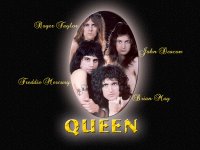 Queen released their third album, Sheer Heart Attack, before the end of 1974. The music hall meets Zeppelin "Killer Queen" climbed to number two on the U.K. charts, taking the album to number two as well. Sheer Heart Attack made some inroads in America as well, setting the stage for the breakthrough of 1975's A Night at the Opera. Queen labored long and hard over the record; according to many reports, it was the most expensive rock record ever made at the time of its release. The first single from the record, "Bohemian Rhapsody," became Queen's signature song, and with its bombastic, mock-operatic structure punctuated by heavy metal riffing, it encapsulates their music. It also is the symbol for their musical excesses -- the song took three weeks to record, and there were so many vocal overdubs on the record that it was possible see through the tape at certain points. To support "Bohemian Rhapsody," Queen shot one of the first conceptual music videos, and the gamble paid off as the single spent nine weeks at number one in the England, breaking the record for the longest run at number one. The song and A Night at the Opera were equally successful in America, as the album climbed into the Top Ten and quickly went platinum. "
Queen released their third album, Sheer Heart Attack, before the end of 1974. The music hall meets Zeppelin "Killer Queen" climbed to number two on the U.K. charts, taking the album to number two as well. Sheer Heart Attack made some inroads in America as well, setting the stage for the breakthrough of 1975's A Night at the Opera. Queen labored long and hard over the record; according to many reports, it was the most expensive rock record ever made at the time of its release. The first single from the record, "Bohemian Rhapsody," became Queen's signature song, and with its bombastic, mock-operatic structure punctuated by heavy metal riffing, it encapsulates their music. It also is the symbol for their musical excesses -- the song took three weeks to record, and there were so many vocal overdubs on the record that it was possible see through the tape at certain points. To support "Bohemian Rhapsody," Queen shot one of the first conceptual music videos, and the gamble paid off as the single spent nine weeks at number one in the England, breaking the record for the longest run at number one. The song and A Night at the Opera were equally successful in America, as the album climbed into the Top Ten and quickly went platinum. "  Queen were at the height of their popularity as they entered the '80s, releasing The Game, their most diverse album to date, in 1980. On the strength of two number one singles -- the campy rockabilly "Crazy Little Thing Called Love" and the disco-fied "Another One Bites the Dust" -- The Game became the group's first American number one album. However, the bottom fell out of the group's popularity, particularly in the U.S., shortly afterward. Their largely instrumental soundtrack to Flash Gordon was coldly received later in 1980. With the help of David Bowie, Queen were able to successfully compete with new wave with 1981's hit single "Under Pressure" -- their first U.K. number one since "Bohemian Rhapsody" -- which was included both on their 1981 Greatest Hits and 1982's Hot Space. Instead of proving the group's vitality, "Under Pressure" was a last gasp. Hot Space was only a moderate hit, and the more rock-oriented The Works (1984) also was a minor hit, with only "Radio Ga Ga" receiving much attention. Shortly afterward, they left Elektra and signed with Capitol."
Queen were at the height of their popularity as they entered the '80s, releasing The Game, their most diverse album to date, in 1980. On the strength of two number one singles -- the campy rockabilly "Crazy Little Thing Called Love" and the disco-fied "Another One Bites the Dust" -- The Game became the group's first American number one album. However, the bottom fell out of the group's popularity, particularly in the U.S., shortly afterward. Their largely instrumental soundtrack to Flash Gordon was coldly received later in 1980. With the help of David Bowie, Queen were able to successfully compete with new wave with 1981's hit single "Under Pressure" -- their first U.K. number one since "Bohemian Rhapsody" -- which was included both on their 1981 Greatest Hits and 1982's Hot Space. Instead of proving the group's vitality, "Under Pressure" was a last gasp. Hot Space was only a moderate hit, and the more rock-oriented The Works (1984) also was a minor hit, with only "Radio Ga Ga" receiving much attention. Shortly afterward, they left Elektra and signed with Capitol."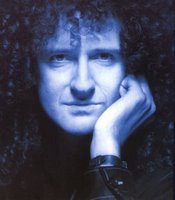 "Faced with their decreased popularity in the U.S. and waning popularity in Britain, Queen began touring foreign markets, cultivating a large, dedicated fan base in Latin America, Asia, and Africa, continents that most rock groups ignored. In 1985, they returned to popularity in Britain in the wake of their show-stopping performance at Live Aid. The following year, they released A Kind of Magic to strong European sales, but they failed to make headway in the States. The same fate befell 1989's The Miracle, yet 1991's Innuendo was greeted more favorably, going gold and peaking at number 30 in the U.S. Nevertheless, it still was a far bigger success in Europe, entering the U.K. charts at number One. "
"Faced with their decreased popularity in the U.S. and waning popularity in Britain, Queen began touring foreign markets, cultivating a large, dedicated fan base in Latin America, Asia, and Africa, continents that most rock groups ignored. In 1985, they returned to popularity in Britain in the wake of their show-stopping performance at Live Aid. The following year, they released A Kind of Magic to strong European sales, but they failed to make headway in the States. The same fate befell 1989's The Miracle, yet 1991's Innuendo was greeted more favorably, going gold and peaking at number 30 in the U.S. Nevertheless, it still was a far bigger success in Europe, entering the U.K. charts at number One. "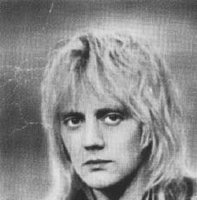 By 1991, Queen had drastically scaled back their activity, causing many rumors to circulate about Freddie Mercury's health. On November 23, he issued a statement confirming that he was stricken with AIDS; he died the next day. The following spring, the remaining members of Queen held a memorial concert at Wembley Stadium, which was broadcast to an international audience of more than one billion. Featuring such guest artists as David Bowie, Elton John, Annie Lennox, Def Leppard, and Guns n' Roses, the concert raised millions for the Mercury Phoenix Trust, which was established for AIDS awareness. The concert coincided with a revival of interest in "Bohemian Rhapsody," which climbed to number two in the U.S. and number one in the U.K. in the wake of its appearance in the Mike Myers comedy Wayne's World. Following Freddie Mercury's death, the remaining members of Queen were fairly quiet. Brian May released his second solo album, Back to the Light, in 1993, ten years after the release of his first record. Roger Taylor cut a few records with the Cross, which he had been playing with since 1987, while John Deacon essentially retired. The three reunited in 1994 to record backing tapes for vocal tracks Freddie Mercury recorded on his death bed. The resulting album, Made in Heaven, was released in 1995 to mixed reviews and strong sales, particularly in Europe. Crown Jewels, a box set repackaging their first eight LPs, followed in 1998. Archival live recordings, DVDs and compilations kept appearing through the new millennium. In 2005 the Queen name was revived but this time with "+ Paul Rodgers" appended to it. Rodgers, the former lead singer of Free and Bad Company, joined Brian May and Roger Taylor -- John Deacon remained retired -- for some live shows, one of which was documented on 2005's Return of the Champions, a double disc on the Hollywood label. ~ Stephen Thomas Erlewine
By 1991, Queen had drastically scaled back their activity, causing many rumors to circulate about Freddie Mercury's health. On November 23, he issued a statement confirming that he was stricken with AIDS; he died the next day. The following spring, the remaining members of Queen held a memorial concert at Wembley Stadium, which was broadcast to an international audience of more than one billion. Featuring such guest artists as David Bowie, Elton John, Annie Lennox, Def Leppard, and Guns n' Roses, the concert raised millions for the Mercury Phoenix Trust, which was established for AIDS awareness. The concert coincided with a revival of interest in "Bohemian Rhapsody," which climbed to number two in the U.S. and number one in the U.K. in the wake of its appearance in the Mike Myers comedy Wayne's World. Following Freddie Mercury's death, the remaining members of Queen were fairly quiet. Brian May released his second solo album, Back to the Light, in 1993, ten years after the release of his first record. Roger Taylor cut a few records with the Cross, which he had been playing with since 1987, while John Deacon essentially retired. The three reunited in 1994 to record backing tapes for vocal tracks Freddie Mercury recorded on his death bed. The resulting album, Made in Heaven, was released in 1995 to mixed reviews and strong sales, particularly in Europe. Crown Jewels, a box set repackaging their first eight LPs, followed in 1998. Archival live recordings, DVDs and compilations kept appearing through the new millennium. In 2005 the Queen name was revived but this time with "+ Paul Rodgers" appended to it. Rodgers, the former lead singer of Free and Bad Company, joined Brian May and Roger Taylor -- John Deacon remained retired -- for some live shows, one of which was documented on 2005's Return of the Champions, a double disc on the Hollywood label. ~ Stephen Thomas ErlewineFor Led Zeppelin see Number 957 & Number 577
For the Beatles see Number 947, 894 & 587
For Metallica visit MM Vol 1 # 033
For David Bowie see Number 634
For Elton John see Number 531
For Annie Lenox visit MM Vol 1 #134
For Smashing Pumpkins see Number 864, 811, 680 & 568
For more Smashing Pumpkins visit MM Vol 1 #139
For Guns n Roses see Number 795 & 557
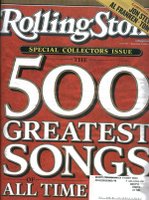 What Rolling Stone Mag think about Queen?....Excessive, decadent, theatrical, androgynous, tasteless, mocking, ironic, self-conscious: Queen lived up to its moniker with gleeful abandon. It could only have happened in the '70s. In fact, the British quar-tet's popularity in the States plummeted immediately after the career peak of 1980's The Game. With good reason, too; the font of crafty hooks suddenly dried up. But in the group's prime, guitarist Brian May and irrepressible lead singer Freddie Mercury provided a steady flow of bombastically catchy schlock-rock hits. Although the albums drag with mediocre filler that sinks the group far below the level of, say, Led Zeppelin in terms of overall achievement, the triumphant pomp of Queen's biggest hits -- "Another One Bites the Dust," "We Are the Champions," "Bohemian Rhapsody" -- eclipses the copious weak material. Mercury stands apart as a sexual sphinx in the decade of not-entirely-liberated excess: A gay man who lived out the classic straight-male fantasy of leading a rock band, he paraded his sexuality before millions -- it remained unspoken, an open secret -- and though stricken with AIDS, he did not publicly admit to having the disease until the day before his death, in late 1991.
What Rolling Stone Mag think about Queen?....Excessive, decadent, theatrical, androgynous, tasteless, mocking, ironic, self-conscious: Queen lived up to its moniker with gleeful abandon. It could only have happened in the '70s. In fact, the British quar-tet's popularity in the States plummeted immediately after the career peak of 1980's The Game. With good reason, too; the font of crafty hooks suddenly dried up. But in the group's prime, guitarist Brian May and irrepressible lead singer Freddie Mercury provided a steady flow of bombastically catchy schlock-rock hits. Although the albums drag with mediocre filler that sinks the group far below the level of, say, Led Zeppelin in terms of overall achievement, the triumphant pomp of Queen's biggest hits -- "Another One Bites the Dust," "We Are the Champions," "Bohemian Rhapsody" -- eclipses the copious weak material. Mercury stands apart as a sexual sphinx in the decade of not-entirely-liberated excess: A gay man who lived out the classic straight-male fantasy of leading a rock band, he paraded his sexuality before millions -- it remained unspoken, an open secret -- and though stricken with AIDS, he did not publicly admit to having the disease until the day before his death, in late 1991. Well i personally LOVE Rolling Stone so all you FREAKS ... kiss my mother trucking ($%*&)(*^%^ and #$@#$! ;^#;^^*(%$^&4!!^&%$^. AMEN
Well i personally LOVE Rolling Stone so all you FREAKS ... kiss my mother trucking ($%*&)(*^%^ and #$@#$! ;^#;^^*(%$^&4!!^&%$^. AMENIt's all yourS crowbarred, cos i'm quite sure we are back to the pop smooch music you enjoy. Now if you don't mind i am going to crank this video.. and LOUD! (Gazza love you Rolling Stone :) ) xxxxx
Rolling Stone Top 500 Songs ranked this song at Number (Sorry Gazza, but we like 3 others, just not this tripe!) and the Album ranked at Number (Sorry, no... but we love you too Gazza) xxxx
This song has a crowbarred rating of 66.4 out of 108
Tags:Queen, 1978, Rock, Gary Shackleton, Led Zeppelin, Freddie Mercury, The Beatles, Metallica, Smashing Pumpkins, Mott The Hoople, David Bowie, Elton John, Annie Lennox, Def Leppard, Guns n' Roses, Mike Myers, Free, Bad Company, Music, Youtube, Music Video, Rolling Stone Magazine, Crowbarred, The Definitive 1000 Songs of all Time
Search by Genre: ALT POP-ALT PUNK-ALT ROCK-ALTERNATIVE-BIZARRE-BLUES-BRIT POP-COMEDY-COUNTRY-CROONER-DANCE-DISCO-DO WOP-ELECTRONIA-FOLK SINGER-FOLK ROCK-FUNK-GARAGE ROCK-GLAM ROCK-GOSPEL-GRUNGE-GUITARIST-HAIR ROCK-HARD ROCK-HIP HOP-INDIE POP-INDIE ROCK-INDUSTRIAL ROCK- INSTRUMENTAL-JAZZ-LAZY SUNDAY-NEW WAVE-NU ROCK-POP-POP ROCK-PROG ROCK-PSYCHEDELIC ROCK-PUNK POP-PUNK ROCK-R&B-RAP-REGGAE-ROCK-ROCK N ROLL-SINGER SONGWRITER-SKA ROCK-SKIFFLE-SOFT ROCK-SOUL-SOUTHERN ROCK-SURF ROCK-SYNTH POP-TENOR-VOCAL
By The Year 1955 to 2005:
1955, 1956, 1957, 1958, 1959, 1960, 1961, 1962, 1963, 1964, 1965, 1966, 1967, 1968, 1969, 1970, 1971, 1972, 1973, 1974, 1975, 1976, 1977, 1978, 1979, 1980, 1981, 1982, 1983, 1984, 1985, 1986, 1987, 1988, 1989, 1990, 1991, 1992, 1993, 1994, 1995, 1996, 1997, 1998, 1999, 2000, 2001, 2002, 2003, 2004, 2005

underlay trademe
Labels: Queen 747












0 Comments:
Post a Comment
<< Home